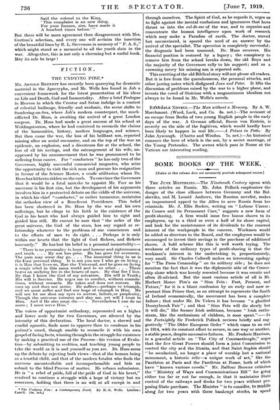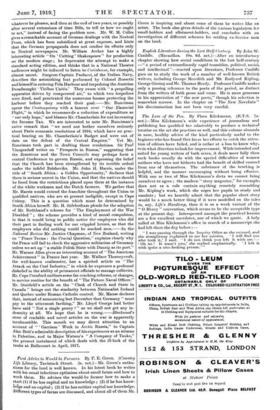Tee JUNE MoxTnLIES.—The Nineteenth Century opens with three articles on
Russia. Mr. John Pollock emphasizes the danger of the close affiance between Germany and the Bol- sheviks, and M. Leonid Andreev, the Russian novelist, makes an impassioned appeal to the Allies to save Russia from her criminals. Mr. J. Ellis Barker, writing on "Labour Unrest: its Causes and its Permanent Cure," suggests a new form of profit-sharing. A firm would issue free bonus shares to its employees, up to a third or even a half of its share capital, and look for the maintenance of its dividends to the renewed interest of the workpeople in the concern. Workmen would be added as directors to the Board, and the employees would be encouraged to invest their savings in the purchase of additional shares. A bold scheme like this is well worth trying. The weakness of the ordinary types of profit-sharing is that the workman's interest in the undertaking is, proportionately, very small. Sir Charles Callwell makes an interesting apology for " The Press Censorship " on its military side ; he does not mention the fact that it was the diplomatic side of the Censor. ship alone which was keenly resented because it was erratic and often ill-advised. But the most curious article of all is Mr. Herbert Moore Pim's on "Sinn Fein: Past, Present, and Future," for it is a blunt confession by an early and now re- pentant Sinn Feiner that, as an attempt to regenerate the South of Ireland economically, the movement has been a complete failure; that under Mr. De Valera it has become "a glorified Donnybrook Fair"; and that "Sinn Fein will die slowly but it will die," like former Irish seditious, because " Irish enthu- siasm, like the enthusiasm of children, is soon spent."—In the Fortnightly Sir Frederick Pollock reviews briefly and sug- gestively " The Older European Order " which came to an end in 1914, with its constant effort to secure, in one way or another, a stable peace, despite successive failures. Mr. Frederic Harrison, in a graceful article on `The City of Constantinople," urges that the five Great Powers should form a joint Commission to control the city and the Straits, and that Saint Sophia should " be secularized, no longer a place of worship but a national monument, a historic relic—a unique work of art," like the Pantheon at Paris and the Pantheon at Rome, both of which have " known various creeds." Mr. Balfour Browne criticizes the "Ministry of Ways and Communications Bill" for going either too far or not far enough, in that it maintains State control of the railways and docks for two years without pro- posing State purchase. The Minister " is to consider, to muddle along for two years with these bankrupt stocks, to spend whatever he pleases, and then at the end of two years, or possibly after several extensions of time Bills, to tell us how we ought to act," instead of facing the problem now. Mr. W. M. CoIlea gives a remarkable account of German dealings with the Neutral Press, which has been subsidized at great expense, and hints that the German propaganda does not confine its efforts only to Neutral newspapers. Mr. William Archer has a highly interesting article " On Cutting' Shakespeare" for production on the modern stage ; he deprecates the attempt to make a standard acting edition, and thinks that in a National Theatre audiences might be induced to listen to Corida11118, for example, almost uncut. Surgeon-Captain Paolucci, of the Italian Navy, describes the astonishing feat performed by Colonel Rossetti and himself in entering Pols Harbour and torpedoing the Austrian Dreadnought ' Viribus Unitis.' They swam with " a propelling apparatus driven by compressed air," to which two torpedoes were fixed, and penetrated the numerous booms protecting the harbour before they reached their goat —Mr. Runciman opens the Contemporary with a lament over Our. Financial Plight," in which he recommends a reduction of, expenditure as ." our only hope," and blames Mr. Chamberlain for not increasing the Income Tax. We are interested to note Mr. Runciman's naive remark that " we need not bother ourselves seriously about Paris economic resolutions of 1916, which have no prac- tical bearing on Mr. Chamberlain's Budget and were out of date on the defeat of the Central Empires." Yet Mr. Runciman took part in drafting those resolutions. Sir Paul Vinogradoff writes on " Prospects in Russia," suggesting that the Zemstvos and the Town Councils may perhaps form a central Conference to govern Russia, and expressing the belief that the Church has been strengthened by its terrible ordeal under the infidel Bolsheviks. Mr. John H. Harris, under the title of " South Africa : a Golden Opportunity," declares that there is serious unrest in the Union, and that the natives should be freed from the restrictions placed upon them at the instance of the white workmen and the Dutch farmers. We gather that Mr. Harris would extend the franchise throughout the Union to qualified natives, who are at present ineligible, except in Cape Colony. This is a question which must be determined by South Africa herself. Mr. H. Sidebotham pleads for the adoption of Mr. Rothband's scheme for " The Employment of the War Disabled" ; the scheme provides a kind of moral compulsion, in that it would bring to public notice the employers who did their part in finding work for our crippled heroes, so that the employers who did nothing would be marked men.—In the National Review Mr. Justice Chapman, of New Zealand, writing on " Peace Terms the Crucial Question," explains clearly why the Peace will fail to check the aggressive militarism of Germany unless we set up a stable Polish State with Danzig as its port." Mr. Warner Allen gives an interesting account of " The American Achievement" in France last year. Mr. Wallace Thomeycroft, the well-known coalmaster, has a spirited article on "The Attack on the Coal Industry," in which he expresses a profound disbelief in the ability of permanent officials to manage collieries. Mr. Cope Cornford outlines some far-reaching reforms, or changes, in service routine for the benefit of " The Future Naval Officer." Mr. Stutfield's article on the " Clash of Church and State in Canada" brings out the similarity between Nationalist Ireland and Quebec under Roman Catholic control. Mr. Mame declares that, instead of announcing last December that Germany " must pay to the uttermost farthing," Mr. Lloyd George had better have said Not a single penny ! " as we shall not get any in- demnity at all. We hope that he is wrong.—B/ackwood's store of readable and novel articles on the war is apparently inexhaustible. This month we may direct attention to an account of " ' Garrison' Work in Arctic Russia," to Captain Alan Bott's admirable description of his experiences as an airman in Palestine, and to Major Watson's " A Company of Tanks," the present instalment of which deals with the ill-luck of the tanks at Bullecourt in April, 1917.



































 Previous page
Previous page